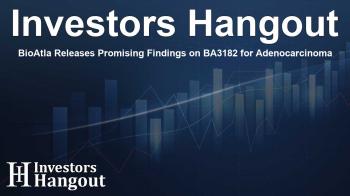BioAtla Releases Promising Findings on BA3182 for Adenocarcinoma

BioAtla Showcases BA3182 Advances at ESMO Gastrointestinal Congress
BioAtla, Inc. (Nasdaq: BCAB), a pioneering biotechnology firm specializing in Conditionally Active Biologic (CAB) therapeutic antibodies, has shared exciting preliminary results from the ongoing dose escalation study of BA3182, a bispecific T-cell engager, at the European Society for Medical Oncology (ESMO) Gastrointestinal Cancers Congress. The event, which took place in Barcelona, Spain, delivered groundbreaking insights into the fight against metastatic adenocarcinoma, a challenging cancer to treat.
Understanding BA3182 and Its Targeted Approach
BA3182 uniquely targets EpCAM, a protein overexpressed in various adenocarcinomas, allowing the treatment to focus on the tumor tissue while sparing healthy cells. The dual binding capabilities of BA3182 are designed to work effectively in the acidic environment typical of tumors, which helps to minimize adverse effects often seen with traditional antibody therapies. This innovative approach has led to promising antitumor responses and manageable adverse events among patients enrolled in the trial.
Study Overview of BA3182
As of mid-2025, the Phase 1 study has included 39 participants, all of whom had previously undergone multiple lines of therapy, making their cases particularly challenging. The trial investigates multiple dosing levels—from 0.0026 mg to 0.6 mg BA3182—administering either subcutaneously or intravenously. The primary aim is to evaluate safety and determine the optimal dose for subsequent phases of the study.
Notable Findings from the Trial
The preliminary data presented shines a light on several key outcomes:
- The vast majority of patients had a median of three prior therapies, illustrating the need for new treatment avenues.
- Among the tumors assessed, a diverse array of adenocarcinomas was represented, with colorectal cancer being prevalent.
- Dose escalation is currently ongoing, and the study is observing encouraging signs of prolonged tumor control, highlighting BA3182’s potential effectiveness.
- Noteworthy reductions in tumor size were documented, indicating that treatment may be yielding substantial benefits for affected individuals.
“Our ongoing studies are revealing encouraging preliminary outcomes, including tumor shrinkage and a favorable safety profile,” stated Jay M. Short, Ph.D., the CEO of BioAtla. “With continued dose escalation of BA3182, we aim to pave the way for a significant number of patients dealing with advanced adenocarcinoma and related cancer types.”
Safety and Tolerability
One of the compelling aspects of the clinical trial results was the manageable safety profile associated with BA3182. Adverse events were primarily mild and transient, allowing for ongoing treatment without significant interruptions. Most notably, symptoms such as Cytokine Release Syndrome were minimal, and any liver enzyme elevations were resolved quickly, enabling continuous dosing.
Future Directions for BioAtla
With the upward trajectory of these results, BioAtla is poised for further advancements in cancer therapeutics. Continuing the Phase 1 trial not only aids in refining BA3182 but also sets the stage for potential breakthroughs in the treatment of various solid tumors beyond adenocarcinoma.
The anticipated updates from the study in the second half of 2025 could hold significant implications for those suffering from advanced stages of this aggressive cancer type.
Frequently Asked Questions
What is BA3182?
BA3182 is a bispecific T-cell engager antibody that targets EpCAM and CD3, specifically designed for advanced adenocarcinoma treatment.
How is BA3182 administered?
BA3182 can be administered via subcutaneous or intravenous routes, offering flexibility in dosing based on patient needs.
What types of cancer is BA3182 targeting?
BA3182 is primarily targeting metastatic adenocarcinoma but shows potential for other solid tumor types due to its unique mechanism of action.
What kind of side effects are associated with BA3182?
Preliminary results indicate that the side effects associated with BA3182 are generally low-grade, transient, and manageable, allowing for continued patient care.
When can we expect updates on the BA3182 study?
Additional updates regarding the Phase 1 study of BA3182 are expected to be shared in the second half of 2025, promising more insights into its efficacy and safety.
About The Author
Contact Dylan Bailey privately here. Or send an email with ATTN: Dylan Bailey as the subject to contact@investorshangout.com.
About Investors Hangout
Investors Hangout is a leading online stock forum for financial discussion and learning, offering a wide range of free tools and resources. It draws in traders of all levels, who exchange market knowledge, investigate trading tactics, and keep an eye on industry developments in real time. Featuring financial articles, stock message boards, quotes, charts, company profiles, and live news updates. Through cooperative learning and a wealth of informational resources, it helps users from novices creating their first portfolios to experts honing their techniques. Join Investors Hangout today: https://investorshangout.com/
The content of this article is based on factual, publicly available information and does not represent legal, financial, or investment advice. Investors Hangout does not offer financial advice, and the author is not a licensed financial advisor. Consult a qualified advisor before making any financial or investment decisions based on this article. This article should not be considered advice to purchase, sell, or hold any securities or other investments. If any of the material provided here is inaccurate, please contact us for corrections.

